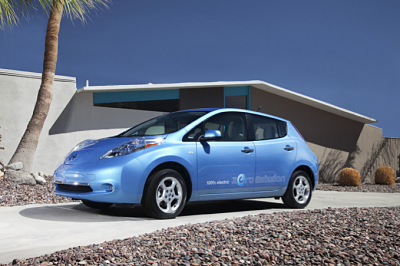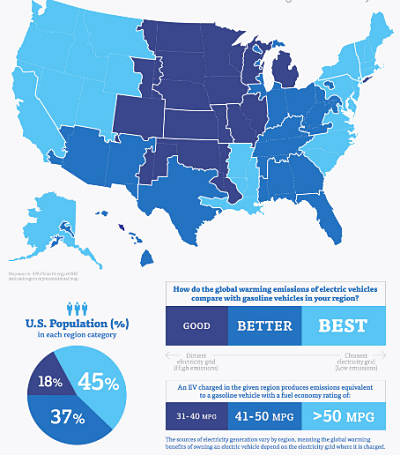
La página que intenta visitar sólo está disponible en inglés. ¡Disculpa!
The page you are about to visit is currently only available in English. Sorry!


The UCS report used fully electric vehicles such as the Nissan Leaf, above, in its analysis. Credit: Nissan
Electric vehicles like the Nissan Leaf have lower greenhouse gas emissions than your typical gas-powered car, but how much lower depends on where you’re plugging in, a new report shows. It all comes down to how clean a region’s electricity grid is: The greener the source of the juice that fuels the EV, the lower the car’s carbon footprint.
Coal-fired power plants, for instance, produce nearly twice the emissions of natural gas-fired facilities, while renewable sources such as wind and solar produce scant emissions.
So what does that mean? In terms of global warming emissions, charging an EV New York is equivalent to driving a gas-powered vehicle that gets more than 70 mpg; powering that same EV in Colorado produces global warming emissions equivalent to a gasoline vehicle achieving about 33 mpg. Yesterday the science-based advocacy group the Union of Concerned Scientists released the report, titled “State of Charge: Electric Vehicles’ Global Warming Emissions and Fuel-Cost Savings Across the United States.”

Nearly half of Americans live is “best” regions where charging an EV on the electricity grid emits less global warming pollution than driving even the best hybrids.
A few key findings:
Another plus is the cost savings: Regardless of where EV owners charge their cars, they’ll save from around $750-$1,200 annually, compared to driving a compact car that gets 27mpg (assuming gas costs $3.50/gallon), the report found.
With a range of EVs and plug-in hybrids now on the market, including the Nissan Leaf, Ford Focus, Chevrolet Volt and Toyota Prius—and with gas prices across the country hovering around $4/gallon—the report offers a timely resource for consumers looking to buy a new car.
In September, Audubon’s Green Guru, Susan Cosier, looked at this very question of whether electric cars reduce pollution in the long run. One handy source she recommends checking: To find out which fuel your utility uses, go to epa.gov/cleanenergy/energy-and-you/how-clean.html.